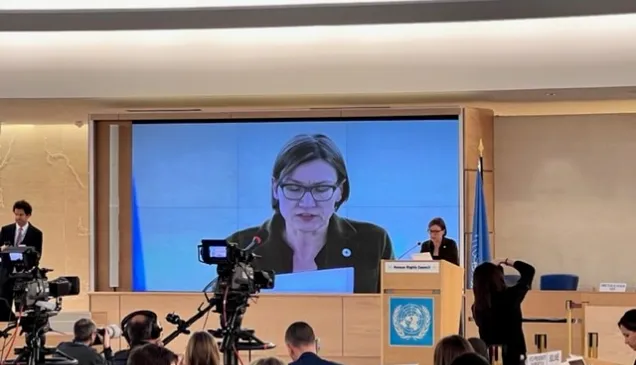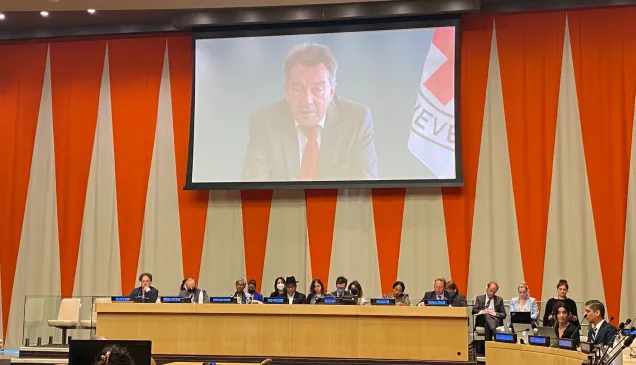27th session, Human Rights Council
The ICRC is greatly encouraged by the interest taken by the Human Rights Council and its members in the issue of detention. It would like to take this opportunity to share its experiences in this regard, particularly on the human impact of overcrowding.
The ICRC has been working in behalf of detainees for over 150 years now; detention work has been one of the most significant aspects of the ICRC's activities throughout its existence. In 2013, the ICRC conducted detention-related activities in about 100 operational contexts: it made more than 4,800 visits to 1,700 places of detention, in which more than 756,000 individuals were being held.
The ICRC has witnessed, in very diverse environments and over many years, the consequences of overcrowding for detainees and the authorities. In fact, overcrowding is becoming more widespread in a number of countries and places of detention. It is a matter of very serious humanitarian concern in itself, as it automatically generates sub-standard and often inhumane conditions of detention. It forces an unacceptable number of people to live for extended periods in congested accommodation, with insufficient space to move about, sit or sleep. This seriously compromises the ability of the administrative authorities to fulfil detainees' basic needs in terms of living conditions, medical care, legal aid and family visits. Being squeezed into cramped living quarters, often in appalling hygiene conditions and with no privacy, makes the experience of being deprived of freedom – which is already stressful - exponentially worse. It erodes human dignity and undermines detainees' physical and mental health, as well as their prospects for reintegration.
Besides putting excessive strain on infrastructure, overcrowding increases the potential for tensions and conflicts among detainees and with staff. It quickly leads to difficulties in maintaining good order within the prison, resulting in potentially severe consequences in terms of safety for the detainees, as well as in terms of supervision and security.
The consequences are particularly grave for detainees, but frontline staff, whose job it is to protect the detainees and meet their needs, are also affected. Working conditions for detention staff become very difficult: they are directly exposed to the frustration of detainees in excessive numbers, without the resources needed to guarantee security or access to the most basic services; having to deal with all this, and with the constant pressure and risks of various kinds, can become overwhelming.
The ICRC knows from experience that situations of overcrowding, once established, deteriorate rapidly: the increasing congestion, the loss of motivation among staff, and the development of parallel coping mechanisms or corruption have a cumulative, adverse impact on the entire criminal justice system.
Overcrowding is not inevitable; it can be avoided. Even if it is widespread and long-lasting, it should never become commonplace. It is vital, from a humanitarian point of view, to address the issue of overcrowding in places of detention. This is a difficult and challenging undertaking, as overcrowding has numerous and cumulative causes, largely external to the prison system itself. It cannot be addressed only at the level of prisons; it requires a holistic and coordinated response from a broad range of authorities, including policy makers, and the involvement of society as a whole.
The cycle of overcrowding can be broken. States must invest in efforts to improve the complex interactions between various essential actors, such as the legislature, judiciary, police, prosecutors, court administrations and oversight bodies. The ICRC is aware that questioning criminal policies, embarking on legislative or procedural changes and altering long-standing judicial practices are not to be undertaken lightly and far from straightforward tasks; nevertheless, it is of the view that they are vitally important for tackling the issue of overcrowding. In this regard, considerable sensitivity will also be required when confronting commonly held perceptions of detention or investing in alternatives to it, while reassuring the public that measures are being taken to fight crime.
There is a great deal of information about prison overcrowding, but the ICRC is of the view that there is a need for holistic and practical guidance on preventing it, addressing it where it already exists, and alleviating its humanitarian consequences.
To this end, it joined forces with the United Nations Office on Drugs and Crime to draft a handbook on strategies for reducing overcrowding in prisons. Copies of the handbook, which was published at the beginning of 2014, are available in the back of the room and on the UNODC's website. The handbook aims to promote understanding of the various interests, concerns and perspectives with regard to overcrowding, advance the establishment of common conceptual frameworks and, as a result, pave the way for coherent strategies for addressing overcrowding in a comprehensive manner. It is the ICRC's experience that small but coordinated steps by a broad range of actors can make a real difference in the resolution of complex problems.
In closing, the ICRC wishes to reaffirm its commitment to supporting the work of the Human Rights Council on detention. It will continue to follow this issue, and all related ones, with great interest; and is ready to contribute to any future discussions on this issue.


